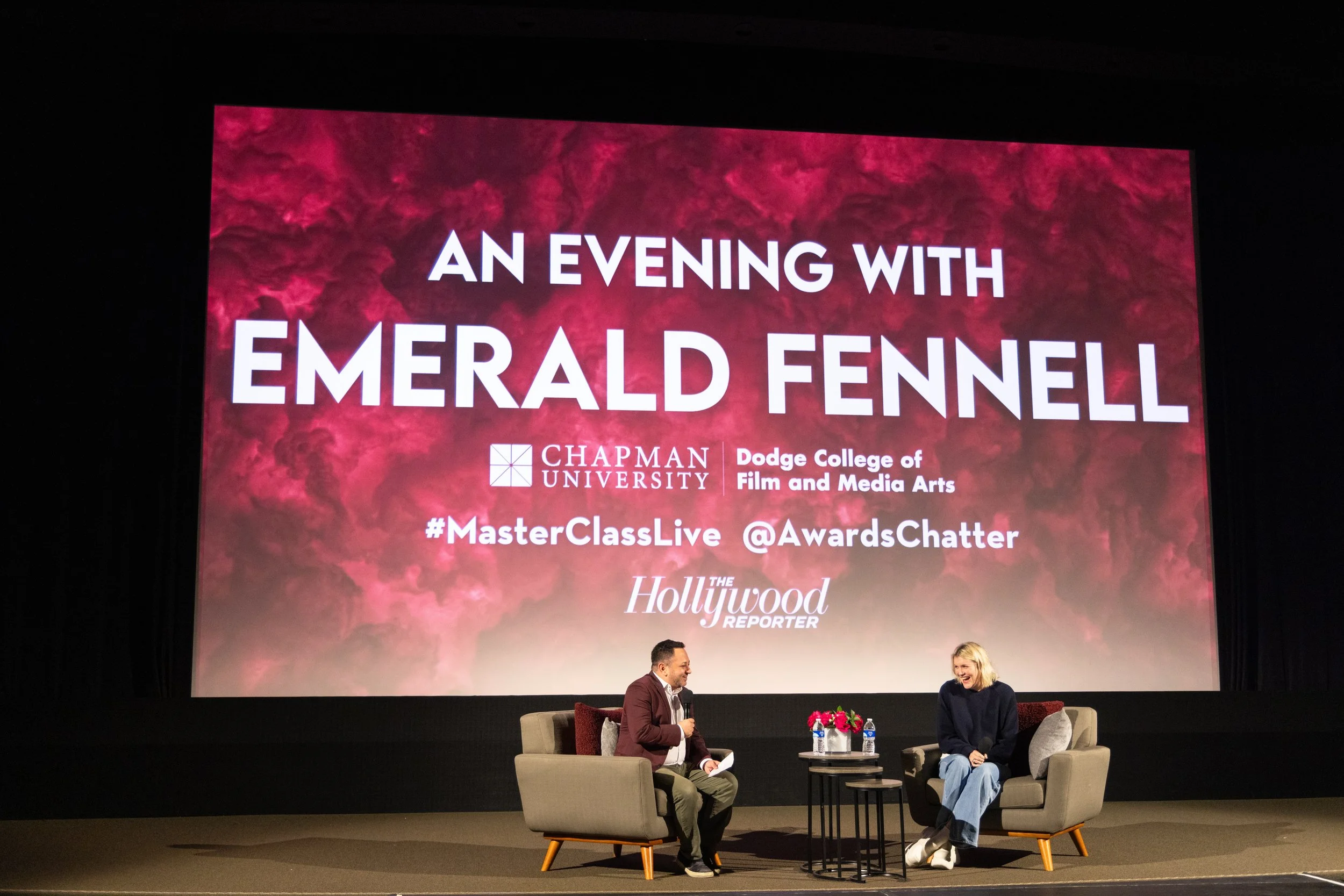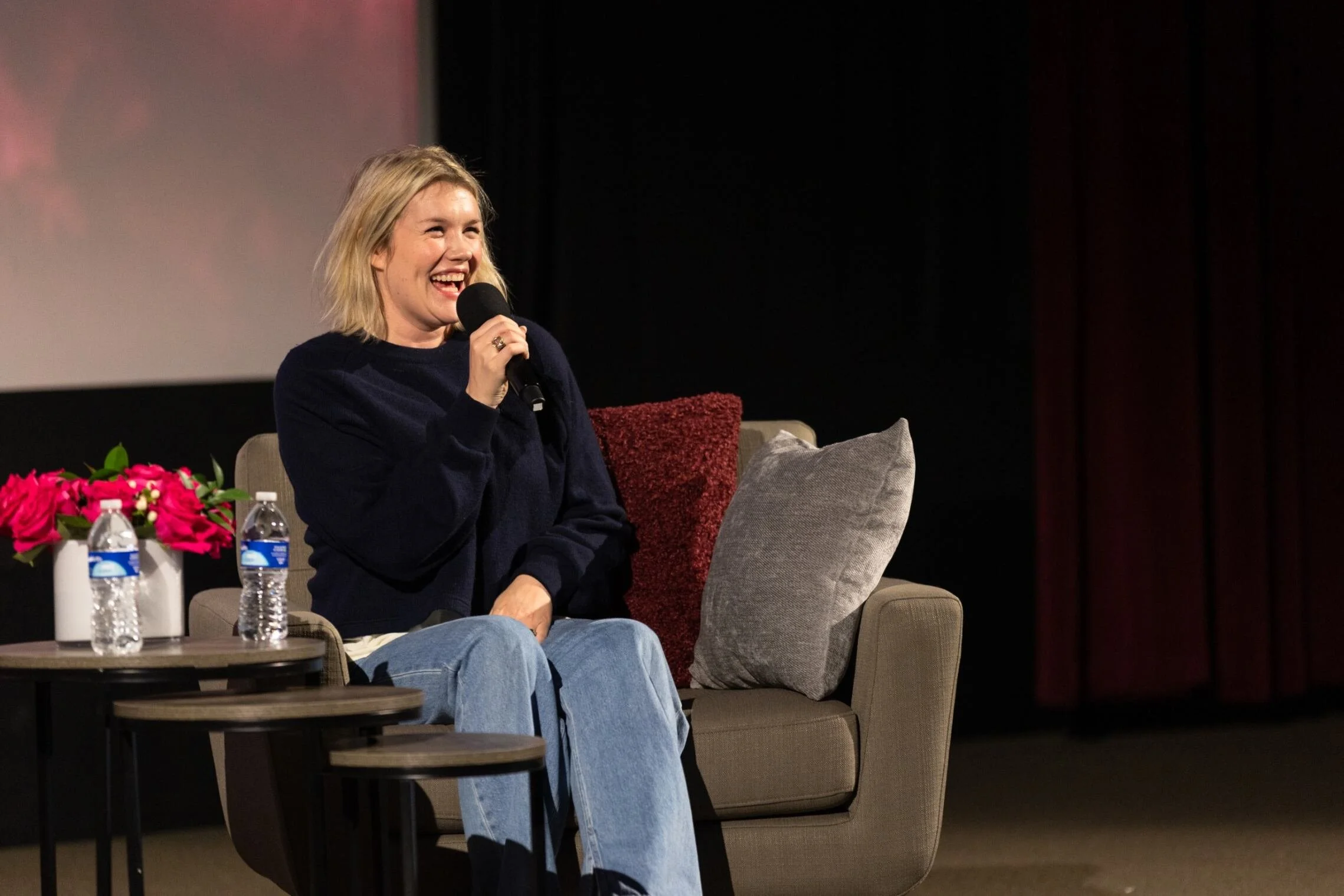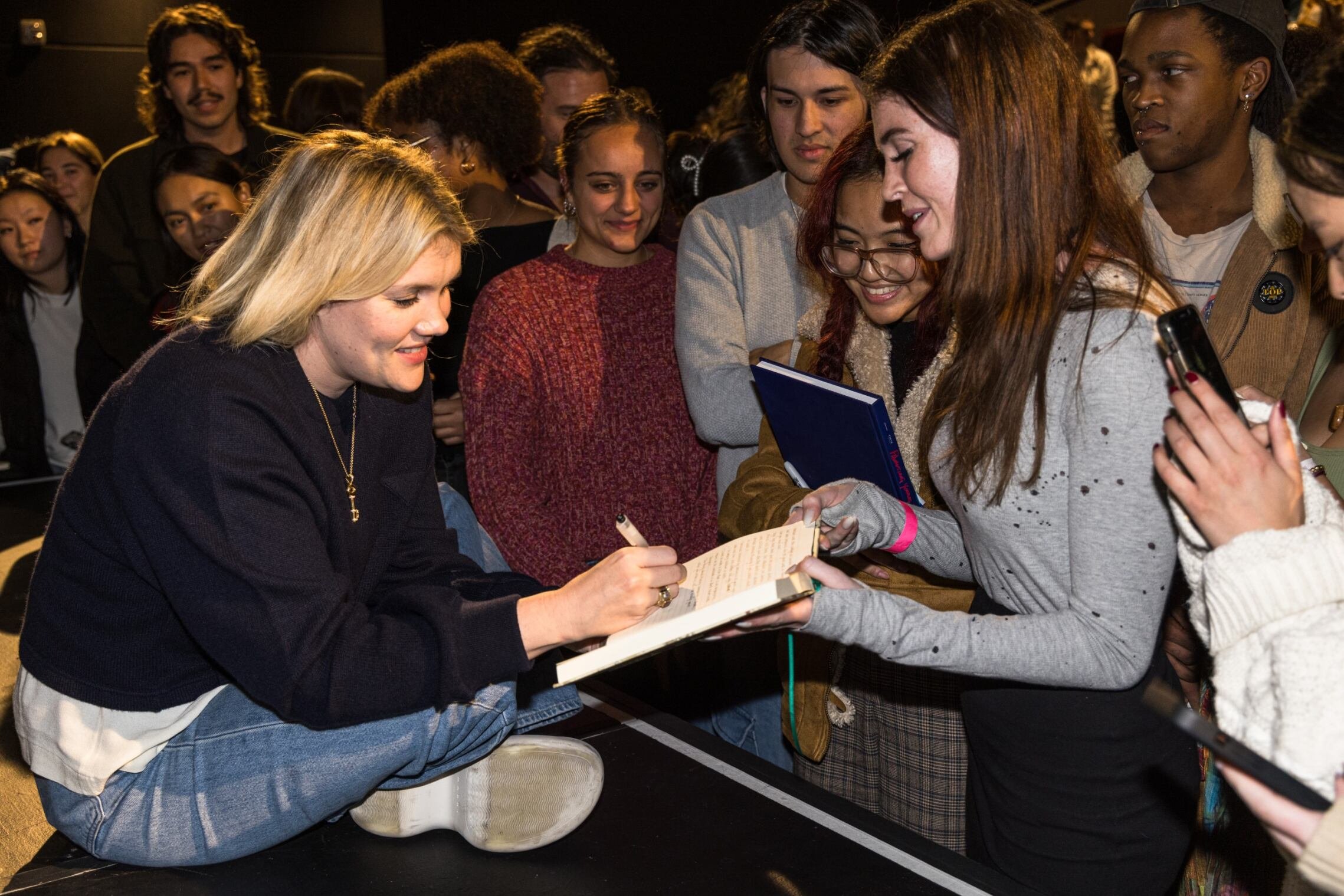Emerald Fennell wants audiences to squirm with new film “Saltburn”
On Nov. 30, three-time Emmy nominee and Academy Award winner Emerald Fennell joined a theater full of students excited to see her newest film “Saltburn” and hear the motivation behind the art in the Q&A that followed. Photos courtesy of Matt Harbicht
If you had told young Emerald Fennell that she would become an actress, move to America and write stories about murder, she probably would have believed you. That’s always been her dream. The night before she stepped on set for her directorial debut film “Promising Young Woman,” her mother sent a video of her as a child saying those exact wishes.
“I think I really just wanted to do anything to do with films, to do with theater. If you want to do this job or work in this industry, it tends to be quite a singular pursuit. I think really, for me, the first time I was really even aware of television, of films, I knew I wanted to have something to do with it. Probably like lots of people here.”
On Nov. 30, the three-time Emmy nominee and Academy Award winner joined a theater full of Chapman students who had just viewed her sophomore feature film, “Saltburn.” The conversation that followed, moderated by Awards Chatter podcast host and Chapman professor Scott Feinberg, chronicled Fennell’s career from the horror books she read as a child to her process of bringing “Saltburn” to life.
After finding an agent, acting in more plays and landing roles in films like “Mr. Nice” and the series “Any Human Heart,” Fennell found her way to a movie directed by Rodrigo Garcia in 2011 called “Albert Nobbs.” This is the project where she met her Hollywood counterpart Phoebe Waller-Bridge, known for “Fleabag” and “Indiana Jones and the Dial of Destiny.”
“I just completely fell in love with her, as everyone who's ever met her does, because she’s not like anyone in the world,” Fennell said. “She was doing (theater) and I was writing. I think we connected as people who wanted to make our own things really desperately.”
They became inseparable.
Each of their careers developed parallel, Fennell going off to star in what we could call her breakthrough role “Call the Midwife,” and Waller-Bridge creating her hit show “Fleabag.” Their careers merged together again with the romantic thriller “Killing Eve.”. Waller-Bridge had written the first season but was always slated to go write the second season of “Fleabag.” Waller-Bridge brought Fennell on as head writer for season two, which landed her two Emmy nominations.
Overlapping with filming and post-production of “Killing Eve” was an audition and eventual casting in season three of “The Crown” as Camilla Parker Bowles, which also got her an Emmy nomination for acting. While she was filming “The Crown,” she was simultaneously prepping for “Promising Young Woman,” her first feature film. She filmed “Promising Young Woman,” had a baby and filmed the fourth season of “The Crown” before the COVID-19 pandemic happened.
The pitching process of “Promising Young Woman” is one she looks back on often.
When she was pitching —- a majority of the time to a room full of men — she would pitch the cold open: Cassie is drunk in a club. It seems like the story is going to be about something terrible that happens to this woman, but it ends with Cassie standing up and revealing she’s not drunk. Fennell recalls that the men in the room would say: “Holy shit. So she’s a psycho?” She would then explain the point to them, saying Cassie is actually the one that is fine.
Right around the same time as pitching the film, the news of Harvey Weinstein’s acts of misconduct were released. When asked about this news possibly informing her pitching, Fennell knew its impact.
“It might have had some bearing on it getting funded and made, but certainly, it didn’t have bearing on the writing. I started writing it a few years before. Also, something I have said and also feel very much about #MeToo is that it wasn’t news to women; it was only news to men. None of us were shocked by any of the stories. It was a revelation for the people who have never been on the receiving end of that kind of attention.”
She would later go on to win an Academy Award for Best Original Screenplay for “Promising Young Woman” at the only Oscars to ever be held in a train station. LuckyChap, Margot Robbie’s production company, produced her film “Promising Young Woman.” When Fennell first heard the rumors of a Barbie movie in the works at LuckyChap, she became obsessed. One day, she got a text from Robbie asking if she would play Midge, the pregnant Barbie, in “Barbie.” Of course, she couldn’t turn the offer down.
A sophomore film can be tricky, but “Saltburn” was always going to be the next project. Her writing process is quite long, and no one hears a peep about it until the script is completely done. Not her agents. Not her managers. Not her husband.
“There are things in this film, and in ‘Promising Young Woman,’ that you kind of don’t really want to discuss with other people until you figure it out yourself,” Fennell said. “I’ve been waiting my whole life to do this. It’s been my dream for so long. So to be able to make something else, to make another film, the way I wanted to make it was the greatest gift. Obviously, there are moments where it's terrifying or difficult or grueling, but it's a joy.”
Fennell wanted to make an early 2000s, old-fashioned, Gothic movie in a British country house where a character looks back over a time in their life that changed them completely.
“15 years ago, wherever you are in time, is terrible,” Fennell said. “It’s incredibly humanizing, when you’re dealing with very beautiful people in a very timeless world, but you run the risk of everyone just looking like they’re in a fashion shoot. If you look earlier, they suddenly become fallible people with their shit hair and their bad fake tans and their awful tattoos and their Livestrong bracelets. Suddenly, they are humans.”
Fennell spoke about making “Saltburn” an experience for audiences, one meant to be watched in a dark room full of strangers. During the screening, Fennell revealed that audiences of earlier screenings had a variety of reactions: squealing, giggling, being bored, people saying “It’s just Monday.” She doesn’t understand why or when we decided as a society that we had to sit in grave silence when watching a movie. She believes audiences should be having visceral reactions to scenes like the bathtub and grave scene in “Saltburn.”
Fennell’s ability to push the boundaries of film and continue to rock Hollywood as a prominent female filmmaker has inspired junior creative producing major, Dakota Booker, in many ways.
“Emerald Fennell is one of a kind. As a woman filmmaker, I find her art extremely inspiring, especially for someone (like me) who wants to create dramas/horror films in a similar genre. Fennell’s films make me feel comfortable to step outside the box with my own storytelling.”
When asked at the Q&A to give advice to aspiring female filmmakers, Fennell gave two pieces of advice female students should be sure to take with them throughout their careers.
“I think the thing that I wish I’d known is that failure is an inbuilt part of it and a necessary part of it. But from a creative standpoint, the thing that I really do think, especially as a woman, is that you know best. People will want to tell you that you don’t know. They will be kind and well-meaning and paternalistic and helpful, but they don’t know. They don’t know you. So trust yourself, even if everyone’s telling you that you’re wrong. If you believe it, then stick with it.”
Dodge College of Film and Media Arts Master Classes are available to all Chapman students and alumni. Seats are available either on a first-come, first-served basis or by lottery system, depending on the Master Class. Dates, times, upcoming guests and additional information can be found in the lobby of Marion Knott Studios or on the Dodge College Instagram account.



